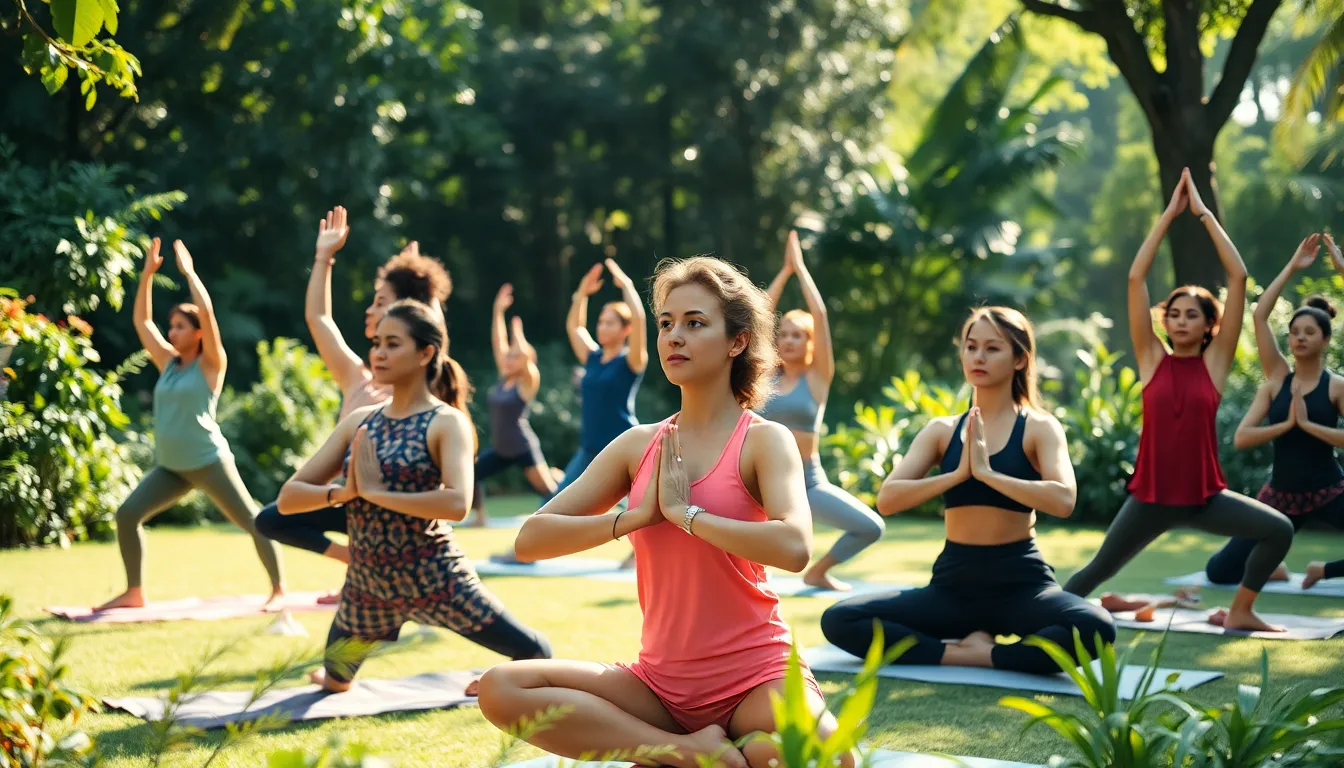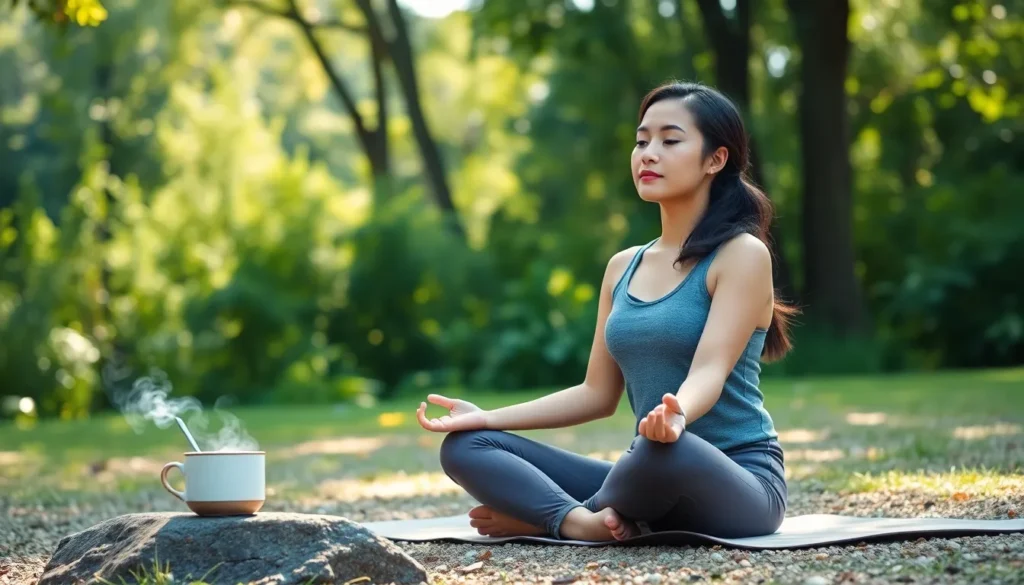In a world buzzing with distractions, finding a moment of peace can feel like searching for a needle in a haystack. Mindfulness practices offer a refreshing escape from the chaos, allowing individuals to reconnect with the present and discover a sense of calm. Imagine sipping your coffee while fully savoring its rich aroma instead of scrolling through social media—sounds like a dream, right?
Table of Contents
ToggleOverview of Mindfulness Practices
Mindfulness practices enhance an individual’s ability to remain present in the moment. These techniques help reduce stress, improve focus, and foster emotional regulation. Techniques include meditation, yoga, and deep-breathing exercises, each offering distinct benefits.
Meditation often involves focusing on the breath or a specific thought. Practitioners can engage in guided or unguided meditation sessions. Research indicates that regular meditation can lead to reduced anxiety and improved emotional resilience.
Yoga combines physical movement with mindfulness principles. Various styles, like Hatha and Vinyasa, adapt to different experience levels. Participants benefit from increased flexibility and strength, while also cultivating mental clarity.
Deep-breathing exercises promote relaxation by slowing down the breathing rate. Practicing simple techniques, such as the 4-7-8 method, allows individuals to manage stress effectively. Research shows that deep breathing can lower heart rates and improve overall well-being.
Incorporating mindfulness into daily routines can also prove beneficial. Simple actions, such as mindful eating or walking, encourage awareness of sensory experiences. Engaging with surroundings helps strengthen the connection to the present.
Overall, mindfulness practices offer valuable tools for navigating modern life challenges. Individuals who prioritize consistent practice often experience profound shifts in their mental landscapes. As awareness grows, the myriad benefits of mindfulness become increasingly accessible.
Benefits of Mindfulness Practices

Mindfulness practices offer numerous advantages for overall well-being. These techniques promote mental clarity and physical health, making them essential for managing daily stressors.
Mental Health Improvements
Mindfulness aids in reducing symptoms of anxiety and depression. Studies show that regular meditation fosters emotional resilience. Practicing mindfulness enhances self-awareness, allowing individuals to identify triggers more effectively. This heightened awareness contributes to improved emotional regulation and decision-making. Participants in mindfulness programs report lower levels of stress and greater overall satisfaction with life.
Physical Health Benefits
Mindfulness also significantly impacts physical health. Regular yoga practice improves flexibility and balance, leading to better overall physical function. Deep-breathing exercises lower heart rates, contributing to stress reduction. Techniques like the 4-7-8 method have shown effectiveness in promoting better sleep quality. Participants often experience lower blood pressure and reduced chronic pain.
Popular Mindfulness Practices
Mindfulness practices encompass various techniques designed to cultivate awareness and presence. These methods can significantly enhance mental clarity and emotional well-being.
Meditation Techniques
Meditation includes several techniques tailored for different needs. Focused attention meditation, for example, centers on breath or specific thoughts. Research shows that this practice can reduce anxiety levels and foster emotional resilience. Guided meditation utilizes recorded instructions or live facilitators to help relax the mind. Loving-kindness meditation, another option, encourages expressions of compassion toward oneself and others. Regular engagement in these practices can lead to notable shifts in one’s mental state.
Breathing Exercises
Breathing exercises serve as effective tools for relaxation and stress relief. The 4-7-8 technique promotes calm by inhaling for four counts, holding for seven counts, and exhaling for eight counts. Diaphragmatic breathing enhances oxygen flow, directly impacting heart rates and overall well-being. Box breathing, often used by athletes and professionals, involves inhaling, holding, exhaling, and holding again for equal counts. Each method offers immediate benefits, making them suitable for daily routines or quick breaks.
Mindful Movement (Yoga, Tai Chi)
Mindful movement practices, such as yoga and Tai Chi, combine physical activity with mindfulness. Yoga improves both flexibility and mental clarity through various postures and breath control. Different styles exist, from restorative yoga for relaxation to vinyasa for more dynamic sequences. Tai Chi focuses on slow, flowing movements and deep breathing, enhancing balance and coordination. Both practices encourage present-moment awareness, fostering a deeper connection between body and mind.
How to Incorporate Mindfulness Practices into Daily Life
Mindfulness practices can seamlessly fit into everyday activities. They enhance well-being while fostering a greater sense of presence.
Creating a Mindfulness Routine
Establishing a mindfulness routine simplifies daily practice. Morning meditation for five to ten minutes sets a positive tone for the day. Evening reflections before bed allow for assessing thoughts and feelings. Scheduling mindful breaks during work, even for just a few moments, can boost focus and clear distraction. Regularly engaging in yoga or stretching promotes both physical and mental clarity. Mindful eating during meals encourages savoring flavors and appreciating food. Each moment spent practicing ultimately reinforces the connection to the present.
Overcoming Obstacles to Mindfulness
Sometimes challenges arise when incorporating mindfulness. Finding time can seem difficult, but even small increments of practice hold value. Distractions might surface, yet acknowledging them without judgment creates an opportunity for increased awareness. Cultivating patience is essential, as progress in mindfulness unfolds gradually. Feeling pressure to “get it right” can hinder experience, so embracing imperfection allows for a more organic practice. Seeking support from mindfulness groups or apps can also provide encouragement, making obstacles feel less daunting. Staying committed empowers individuals to continue on their mindfulness journey.
Mindfulness practices offer a powerful way to navigate the complexities of modern life. By dedicating even a few moments each day to techniques like meditation or deep-breathing exercises, individuals can foster a deeper connection to the present and experience significant mental and physical benefits.
Incorporating mindfulness into daily routines not only enhances focus and emotional regulation but also promotes overall well-being. Embracing these practices can lead to profound shifts in perspective, ultimately allowing for a more fulfilling and balanced life. With consistent effort and a willingness to engage with the present moment, anyone can unlock the transformative potential of mindfulness.



